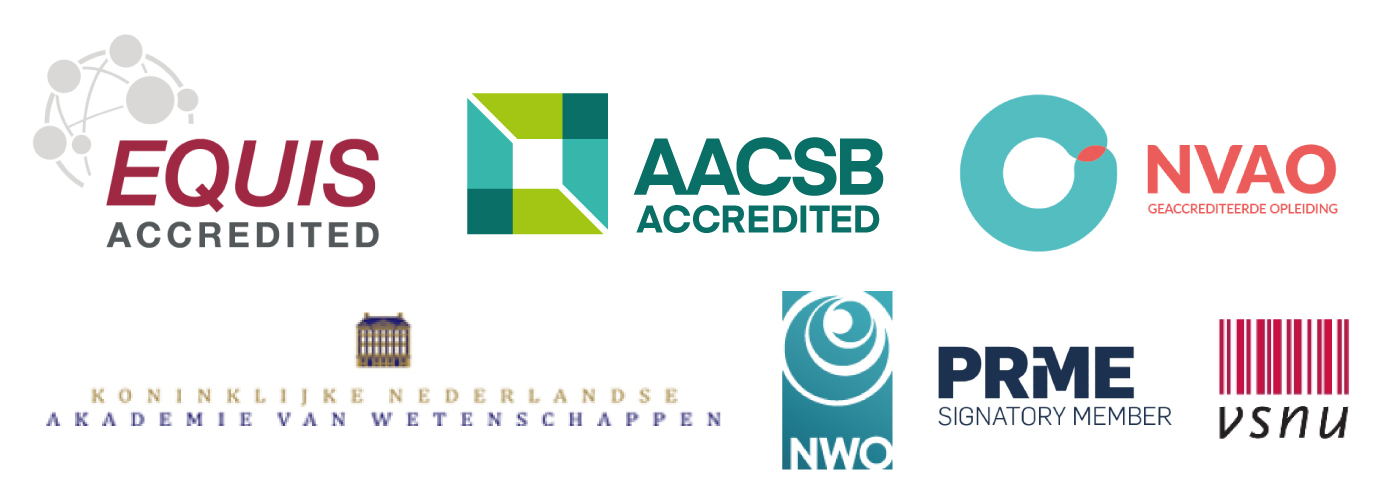Accreditation and assessment

Accreditation is a mark of excellence that ensures universities meet high academic and research standards. It validates the quality of our education, faculty expertise, and institutional integrity. At the University of Groningen, the Faculty of Economics and Business (FEB) is proud to hold prestigious accreditations dedicated to business and economics education.
FEB belongs to the 1% of business schools worldwide with both EQUIS and AACSB accreditations.
EQUIS - Reaccredited in 2024 - Accredited in 2014
EQUIS is one of the two leading international accreditation bodies for business education, run by the European Foundation for Management Development (EFMD). EQUIS stands for EFMD Quality Improvement System, EFMD 'acts as a catalyst to enhance excellence in management education and development globally'. Important themes for EQUIS are internationalization, corporate connections, and ethics, responsibility and sustainability.
AACSB Reaccredited in 2022 - Accredited in 2011
The AACSB International accreditation represents the highest standard of achievement for business schools worldwide. AACSB evaluates a business school’s mission, faculty qualifications and contributions, programmes, and other critical areas on a five-year review cycle. Particularly important for AACSB are the assurance of learning standards. Institutions that earn accreditation confirm their commitment to quality and continuous improvement through a rigorous and comprehensive peer review.
PRME
The Principles for Responsible Management Education (PRME) is a United Nations-supported initiative founded in 2007 that aims to raise the profile of sustainability in business and management education. PRME engages business and management schools to ensure they provide future leaders with the skills needed to balance economic, environmental, and social goals, while drawing attention to the Sustainable Development Goals (SDGs) and aligning academic institutions with the work of the UN Global Compact.
FEB is a signatory member since 2020 and published its first PRME report in 2022.
NVAO
The Accreditation Organisation of the Netherlands and Flanders (NVAO - in Dutch: Nederlands-Vlaamse Accreditatieorganisatie) is the independent accreditation organisation set up by the Dutch and Flemish governments, whose primary goal it is to provide an expert and objective judgement of the quality of higher education in Flanders and the Netherlands.
NVAO website
NVAO re-accreditation for twenty FEB degree programmes
NWO
The Netherlands Organisation for Scientific Research (NWO - in Dutch: Nederlandse Organisatie voor Wetenschappelijk Onderzoek)) funds thousands of top researchers at universities and institutes and steers the course of Dutch science by means of subsidies and research programmes.
KNAW
The Royal Netherlands Academy of Arts and Sciences (KNAW - in Dutch: Koninklijke Nederlandse Akademie van Wetenschappen) was founded in 1808 as an advisory body to the Dutch Government – a role that it continues to play today. The Academy derives its authority from the quality of its members, who represent the full spectrum of scientific and scholarly endeavour and are selected on the basis of their achievements. It is also responsible for seventeen internationally renowned institutes whose research and collections put them in the vanguard of Dutch science and scholarship.
VSNU
The Association of Universities in the Netherlands (VSNU - in Dutch: Vereniging van Universiteiten) represents the shared interests of the fourteen research universities in the Netherlands in the fields of research, education, knowledge transfer, business operations, human resource management and international policy.
| Last modified: | 06 March 2025 3.03 p.m. |
